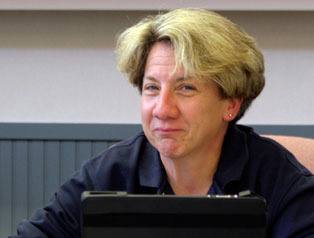Jo Moccia has three more years to move South Whidbey students toward graduation.
That means three more years pursuing the school district’s goal of having 100 percent of graduates “career and college ready.” Superintendent Moccia’s new contract is for three years and officially begins July 1 and ends June 30, 2016. The superintendent’s contract includes a $132,500 annual salary. She was originally hired in 2011 on an annual contract of $130,000, which was raised by her second year with the district.
School board members voted unanimously to approve Moccia’s contract at the board meeting June 26.
“We’re very pleased at the way she has worked to consolidate our buildings,” said Steve Scoles, the school board chairman. “As an alternative to closing the entire middle school, we closed Bayview School, closed the district office, closed the two-story and auditorium. All four of them have rent-paying tenants in them that is bringing in a nice cash flow to the district.”
Despite South Whidbey’s consistent enrollment decline over the past decade, the schools saw a bit of a stabilization. About 50 more students than expected enrolled in the district last school year. In Moccia’s second year with the district, she relocated the alternative high school to the primary campus on Maxwelton Road, where it was reconfigured to a K-12 alternative school. The district office also moved from Camano Avenue near the middle school to the transportation and maintenance facility on Maxwelton Road. South Whidbey schools, however, also saw the departure of longtime elementary school principal Jamie Boyd, the elimination of the transportation and maintenance director’s position, which was split into a maintenance director, and the transportation duties given to Dan Poolman.
Having created a smaller “footprint” with fewer district-occupied buildings, Scoles said the superintendent and assistant superintendent Poolman were major assets to South Whidbey. Poolman also will not receive a salary increase this school year.
“We back her up 100 percent on what she’s done on bringing in new people and changes,” Scoles said.
“For the first time in maybe 10 or 12 years, we actually had student numbers increasing during the year.”
One of the ways South Whidbey school leaders hope to brand the district is as an arts haven. The district recently leased the two-story building on the Langley Middle School campus to Island Dance and leased the campus auditorium to Whidbey Children’s Theater. Moccia stated in earlier school board meetings the district plans to expand its arts program, including the touted school bands.
“The work we have been doing in the district over the past two years has set the stage for the continued growth of the district,” Moccia wrote in an email.
“We remain committed to our goal that by 2020, 100 percent of our students will graduate career and college ready. This means that we have adopted the common core state standards in earnest and are committed to the teacher and principal evaluation process. We are doing this work despite not knowing our funding but with the clear understanding that these mandates, though certainly designed to improve education, are unfunded mandates.”
Districts with similar superintendent contracts include Lake Chelan, Blaine, Chehalis and Anacortes. Blaine has a district-wide enrollment of more than 2,200 students; Chehalis has 3,000; and Anacortes has 2,700.
When Moccia accepted the position, she was superintendent of Averill Park Central School District in New York, where she earned a $145,600 salary, plus benefits.
Scoles lamented the district’s inability to raise Moccia’s contract more amid uncertain state funding. The district also is negotiating with the South Whidbey teachers’ union, and one of the sticking points is salary raises.
“If we’re not getting money from the state, we can’t produce more money out of thin air,” Scoles said.
Beyond the salary, Moccia may take 29 days of paid vacation, with a maximum of 30 if she remains in office another year. One of the stipulations, however, is that the superintendent’s vacation must be taken at “reasonable times and the Board Chair shall be notified.” No more than 20 unused vacation days can carry over from year to year. The superintendent also gets three personal days.
The school board is required to evaluate the superintendent no later than June 30 of each contract year. Extending the superintendent’s contract, Scoles said, is “standard practice” in Washington if the board is pleased with the school chief’s performance.



